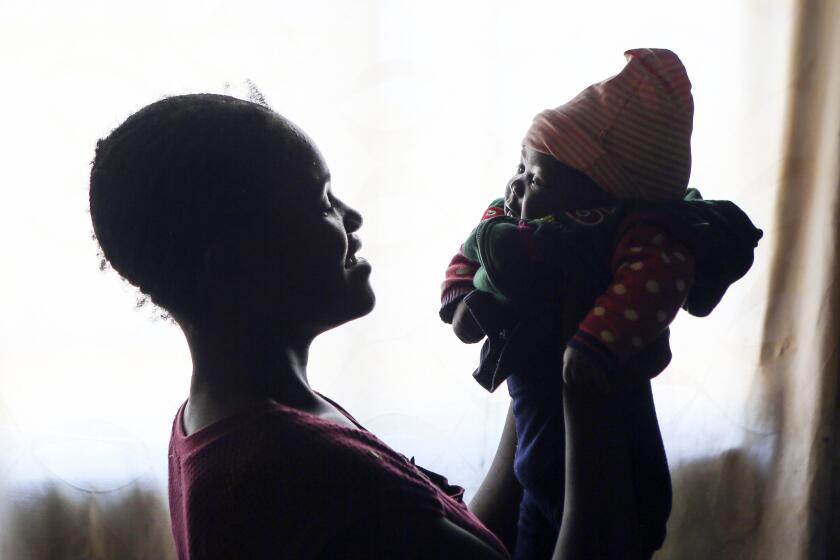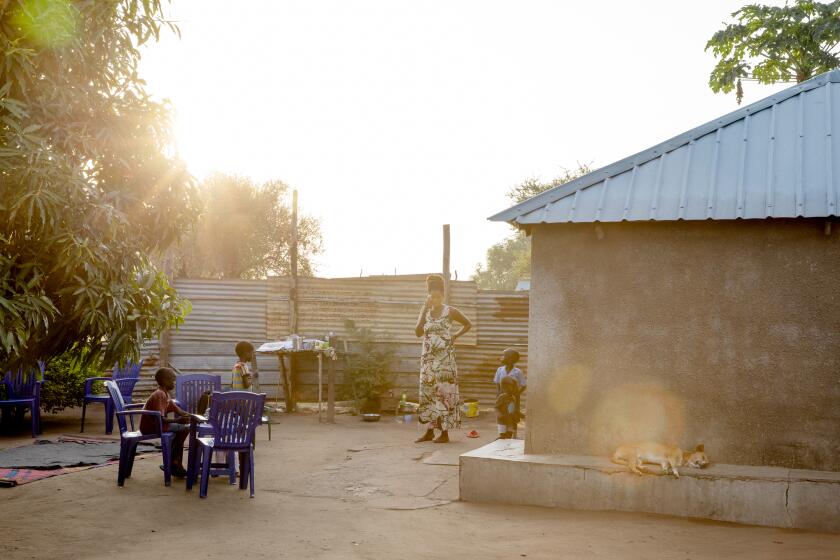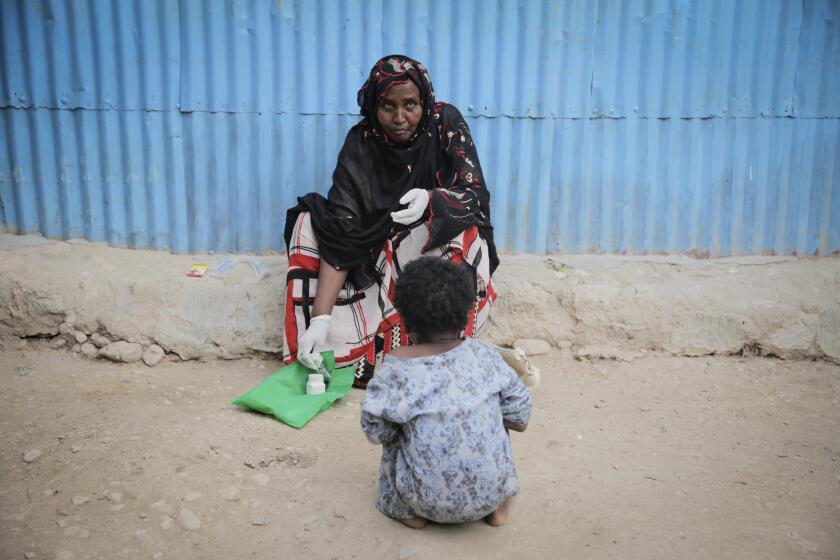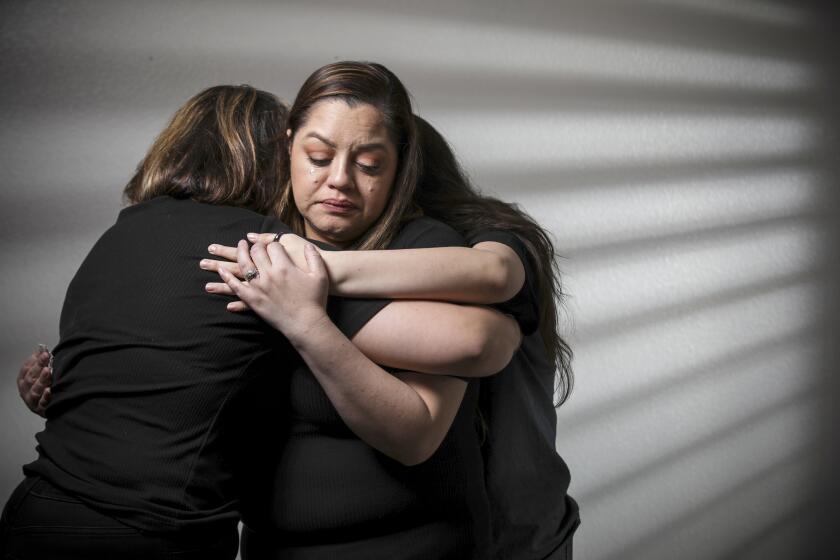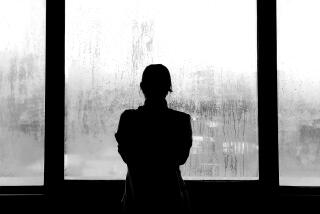For widows in Africa, COVID-19 stole their husbands, homes and future
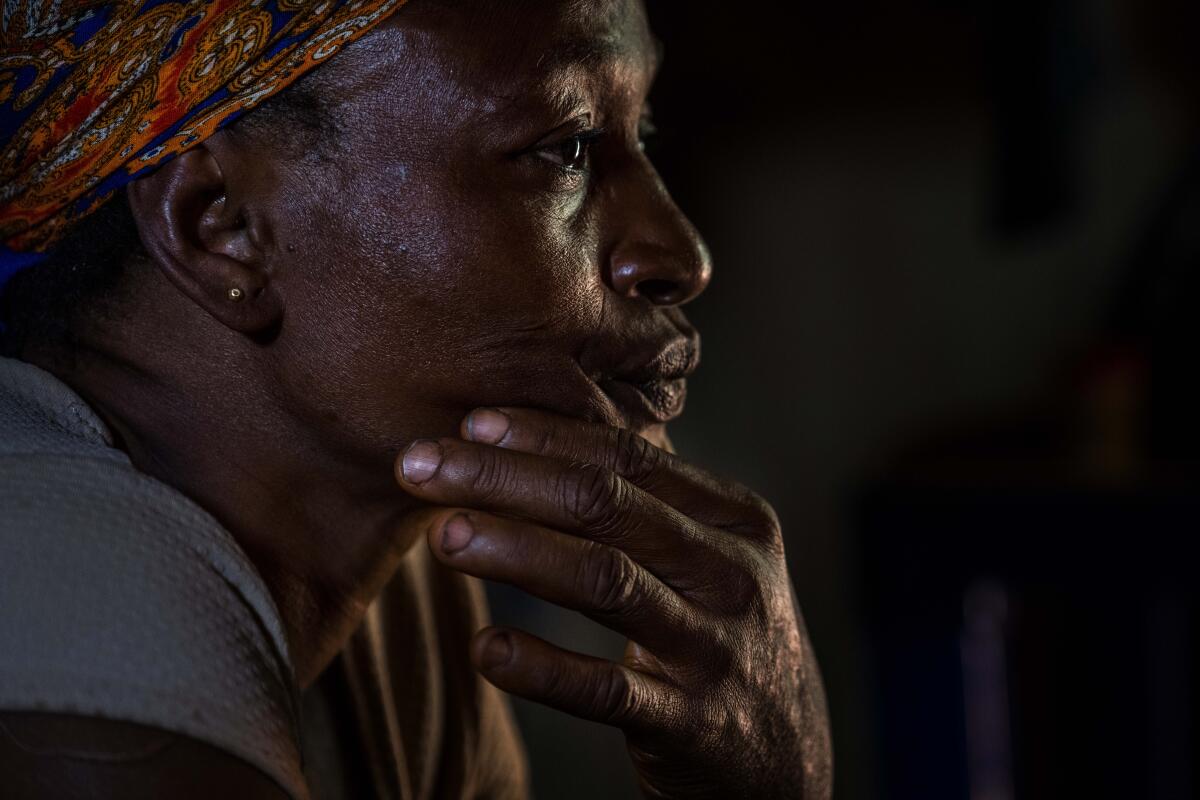
- Share via
UMUIDA, Nigeria — As Anayo Mbah went into labor with her sixth child, her husband battled COVID-19 in another hospital across town. Jonas, a young motorcycle taxi driver, had been placed on oxygen after he started coughing up blood.
Jonas would never meet his daughter, Chinaza. Hours after the birth, Mbah’s sister-in-law called to say he was gone. Staff at the hospital in southeastern Nigeria soon asked Mbah and her newborn to leave. No one had come to pay her bill.
Mbah began the rites of widowhood at the home where she lived with her in-laws: Her head was shaved, and she was dressed in white clothing. But just weeks into the mourning period that traditionally lasts six months, her late husband’s relatives stopped providing food, then confronted her directly.
“They told me that it was better for me to find my own way,” Mbah, now 29, said. “They said even if I have to go and remarry, that I should do so. That the earlier I leave the house, the better for me and my children.”
She left on foot for her mother’s home with only a plastic bag of belongings for Chinaza and her other children.
“I decided that I might die if I continue to stay here with my children,” she said.
Across Africa, widowhood has long befallen great numbers of women — particularly in the continent’s least developed countries where medical facilities are scarce. Many widows are young, having married men decades older. And in some countries, men frequently have more than one wife, leaving several widows behind when they die.
Faced with rising teen pregnancies, Zimbabwe changed a law that long banned pregnant students from schools. Aid groups are urging girls to return.
Now, the coronavirus pandemic has created an even larger population of widows on the continent, with African men far more likely to die of the virus than women, and it has exacerbated the issues they face. Women such as Mbah say the pandemic has taken more than their husbands: In their widowhood, it’s cost them their extended families, their homes and their futures.
Once widowed, women are often mistreated and disinherited. Laws prohibit many from acquiring land or give them only a fraction of their spouse’s wealth, and widows in places like southeastern Nigeria face suspicion over their husband’s death during the mourning period. In-laws can claim custody of children; tradition says kids belong to the father. Other in-laws disown the children and refuse to help, even if they’re the family’s only source of money and food. And young widows have no adult children to support them in communities with extreme poverty and few jobs for women with limited education.
In Nigeria, Africa’s most populous nation, some 70% of confirmed COVID-19 deaths have been men, according to data tracked by the Sex, Gender and COVID-19 Project. Similarly, more than 70% of deaths in Chad, Malawi, Somalia and Congo have been men, according to figures from the project, which is the world’s largest database tracking coronavirus differences between men and women. Other countries likely show similar trends but lack the resources to gather detailed figures.
Experts say some of the widows left behind have nothing while others are pressured to remarry brothers-in-law or be cut off. Widows can start experiencing mistreatment by their in-laws before their husbands are even buried.
Even before the pandemic hit, South Sudanese women were accustomed to building lives on the edge of uncertainty.
“Some are treated as outcasts, accused of being responsible for the death of their husband,” said Egodi Blessing Igwe, spokeswoman for WomenAid Collective, which has aided thousands of widows with free legal services and family mediation.
Some experts say widows face the harshest reality in Nigeria. There, Mbah now raises her children without financial support from her in-laws, who even kept the motorcycle her husband drove as a taxi. She works four jobs, including one as a cleaner at a school where she can no longer afford to send her children.
Her husband had no will, and she hasn’t pursued a legal case against her in-laws. She fears it would only make her situation worse, and finding the time would be nearly impossible.
For some widows who pursue legal action, a will saves the day, said Igwe, with the women’s rights organization.
“The will can really help if men can have the courage to prepare it and continue to update it,” she said. “Unfortunately in this part of the world, we don’t like to talk about death.”
Even in widowhood, women are often still under the oversight of men — adult sons or brothers — and may not be able to pursue a case if the family believes it will bring stigma or shame.
Officials and health workers say ‘cutters’ are visiting girls door-to-door say, as cases of female genital mutilation have increased during the pandemic in parts of Africa.
In Congo, Vanessa Emedy Kamana had known her husband for a decade before he proposed marriage. She worked for the scholar as a personal assistant. By the time their friendship turned romantic, Godefroid Kamana was in his late 60s; she, a single mother in her late 20s. She said she was drawn to his youthful spirit and intellect: He worked at a think tank and had two doctorates from European universities.
When he first tested positive for COVID-19, there was no hospital bed for him, despite his age and status as a diabetic, in the eastern city of Goma, a humanitarian hub with a large U.N. peacekeeping mission presence. Once a spot was secured, his wife spent most of his final days searching for oxygen and pleading with vendors.
The night of his burial, relatives came to the family home where Kamana had just begun her period of mourning. Generally, widows are required to stay in their homes and can receive visitors. Mourning lengths vary by religion and ethnic group. Kamana, whose family is Muslim, was supposed to stay home for four months and 10 days. But her husband’s relatives didn’t wait that long to force her and her young son out on the street.
“I was stripped of everything, of all my possessions,” she said.
She feared her husband’s family would seek custody of her son, Jamel, whom Kamana had adopted and given his surname. Ultimately the relatives did not, because the boy — now 6 — wasn’t his biological child. They did, however, move swiftly to amass the financial assets.
“I was not aware because I was at the house crying for my husband,” she said. “But they came and said: ’These bank accounts belong to us.’”
She, her son and their cat now live in a smaller home her mother kept as a rental property. Kamana sells secondhand clothing at a market while her son is at school. And while she initially received 40% of her late husband’s salary, those funds will soon stop entirely.
Kamana’s marriage was relatively new. He had paid the dowry to her family in 2020, but they had no public ceremony because of COVID-19 restrictions. What mattered most, she said, was that he had accepted her son as his own. Now, the family has taken a bank account set up for the boy.
Even before his father’s death, the teen had penned a school paper on the pain of life during the pandemic.
And it’s painful, Kamana said, when some of her late husband’s relatives insist they’ve lost more than she did.
“No one will be able to replace him,” she said.
In West Africa, widowhood is particularly fraught in the large swaths where many marriages are polygamous. Each wife performs the rituals of grief, but it is the first wife or her children who usually lay claim to the family home and other financial assets.
Saliou Diallo, 35, said she would have been left with nothing after a decade of marriage had her husband not thought to put her home under her name instead of his. Even after his death, she lives in fear that her husband’s older children or relatives will try to take over her small residence on the outskirts of the Guinean capital, Conakry.
Under Guinean law, a man’s multiple wives share a small percentage of his estate, with nearly all of it — 87.5% — going to his children, said Yansane Fatou Balde, a women’s rights advocate. Women rarely contest their inheritance, given the stigma and expense.
Diallo’s husband, El Hadj, 74, had been building the home just for her and their 4-year-old daughter when he fell ill with COVID-19. Diallo was infected too — and terrified. She already knew the burden of losing a spouse: At 13, she became a second wife, only to be widowed in her early 20s.
Her next attempt at marriage unraveled when the man did not take to her three children. Then she was introduced to El Hadj, who already had married multiple women but was willing to raise Diallo’s three kids as his own.
They spent a decade together before the virus hit El Hadj. In his final conversations with his wife, he lamented that her home didn’t have windows yet. That he hadn’t lived long enough to build a well so she wouldn’t have to carry water on her head each day. That other relatives would try to chase her off once he was gone.
During mourning, the first wife refused to provide financially for Diallo — who couldn’t attend the funeral because she tested positive for the virus. Then the first wife’s children came to Diallo’s house and reclaimed the car he’d given her. They took all his documents and checkbooks.
“They wanted to chase me away too,” Diallo said. “I told them: ‘Let me finish my mourning and see my husband’s grave.’”
The children asked for the papers of the house El Hadj had built for her. She provided photocopies but secretly kept the originals.
Her extended family ultimately helped raise money to put windows on her house. Still, she feels her husband’s absence. There is electricity, but no light fixtures. The walls are finished but not painted, and only a few plastic lawn chairs and a mini-fridge furnish the home.
“I am sure God is saving a surprise for me. I surrender to him,” she said. “In the meantime I live on the help of my parents. They support me, and I keep my faith.”
In Diallo’s case, the law has protected her home. But where laws fail to protect widows, the resolution of disinheritance disputes often comes down to family mediation alone.
Back in Nigeria, Roseline Ujah, 49, spent three decades as part of her husband’s extended family. She shared chores and meals with them, even helping to care for her mother- and father-in-law in their later years.
But she said her husband’s brother began scheming to disinherit her and her seven children before her husband, Godwin, had even been buried. Her sister-in-law intervened and managed to save a small portion of land where Ujah now cultivates cocoyam, a root vegetable.
When her husband — who harvested palm wine — first became ill, everyone assumed it was malaria. But medications failed, and his breathing became labored. Hospital doctors diagnosed him with COVID-19, even though no tests were available for confirmation. Without money for a hospital stay, Ujah turned to traditional medicine.
“I kept begging God not to let him die,” she said. “He kept getting weaker and weaker, and we were looking for solutions for him.” He died in their home and was buried in his frontyard.
Only her sister-in-law brought food to the family during their six months of mourning. Ujah was forbidden to leave home. Without support from her extended family, she had to send her children to work on neighbors’ farms for income. Some days they ate nothing at all.
“It was only from the door that I could call the attention of passersby to help me get something at the market,” she said.
Godwin’s youngest two children — 13-year-old Chidimma and 11-year-old Chimuanya — have been especially affected by his death, as their relationship with their father’s family has soured.
Ujah is left to scramble for her family’s survival, making brooms to sell at the local market. She knows her husband would have confronted his family over their mistreatment of her. Without him, she turns to her faith.
“I look up to God, telling him I have no one else,” she said. “He is my husband and the father of my children and of the family, and I will not marry another man.”
More to Read
Sign up for Essential California
The most important California stories and recommendations in your inbox every morning.
You may occasionally receive promotional content from the Los Angeles Times.
